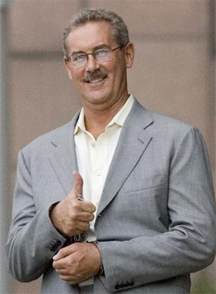(Reuters) – National fundraising committees for the Democratic and Republican parties, President Barack Obama, and other major politicians have declined to return campaign donations totaling $1.8 million from Houston financier R. Allen Stanford, now on trial for allegedly masterminding a $7 billion Ponzi scheme.

The court-appointed receiver charged with returning money to Stanford investors obtained a federal court order last June against five Democratic and Republican campaigns. But they haven’t returned the money. The Democratic Senatorial Campaign Committee received $950,500; the National Republican Congressional Committee (NRCC), $238,500; the Democratic Congressional Cam-paign Committee, $200,000; the Republican National Committee $128,500, and the National Republican Senatorial Committee (NRSC) $83,345.
The contributions to the campaign committees and candidates were given by Stanford himself, Stanford executives, and a political action committee associated with the financier.
The receiver, Ralph Janvey, is also trying to claw back money Stanford donated to individual politicians. The list of his recipients reads like a who’s who of Washington, including President Obama – who received $4,600 from Stanford in his 2008 election campaign – Rep. Pete Sessions (R-Texas), the chairman of the NRCC, and Sen. John Cornyn (R-Texas), the chairman of the National Republican Senatorial Campaign Committee. Janvey is seeking these funds informally, and has not filed lawsuits.
Money has already been returned by House Speaker John Boehner, Senate Majority Leader Harry Reid and Sen. John McCain, among others. But the roughly $154,000 recovered from elected officials is a fraction of the $1.8 million still outstanding.
The $4,600 Janvey is seeking from the Obama campaign reflects only direct contributions from Allen Stanford himself. The total may be as high $31,000 when Stanford’s contributions to Obama’s other campaign committees are included, along with money from senior Stanford executives, and the Stanford Financial Group’s now defunct PAC, according to campaign finance records and an analysis by the Center for Responsive Politics.
“ROBS THE STORE”
The Obama campaign donated the $4,600 contribution to charity on February 18, 2009, just days after Stanford’s alleged fraud came to light. The Obama campaign officially has no comment on the matter, but a source familiar with the campaign’s thinking told Reuters that it does not intend to return the money to the receiver or Stanford investors. Kevin Sadler, lead counsel for the Stanford receivership, condemned the failure by the Obama campaign to turn over the contributions to the receiver. He said “the money was never theirs to begin with,” so they have no more right to the money than an ordinary person who was given it from “a guy who goes into a Seven Eleven and robs the store.”
Stanford is on trial for allegedly bilking $7 billion from investors, the second-largest Ponzi scheme in the nation’s history. He has denied any wrongdoing or taking money from investors.
In his opening statement, assistant U.S. attorney Gregg Costa, alleged: “Some people trusted Mr. Stanford with their entire life savings… He stole from them so he could live the lavish lifestyle of a billionaire.”
Stanford’s attorney Robert Scardino, in his opening, acknowledged that billions of dollars from Stanford’s bank had gone missing, but said that Stanford knew nothing about it, and the money had been taken by a Stanford deputy.
The receiver first wrote to the Obama campaign five days after it gave the money to charity in 2009, asking that it instead be returned to investors. “If you have already donated such amounts to charity, we request you consider donating an equal amount to the Receivership,” Janvey wrote back on February 23, 2009. “By returning such amounts to the Receivership Estate, you will help reduce the losses suffered by victims of the alleged fraud.”
The national campaign committees are working though the court system. They have appealed a federal judge’s order to return the money to a higher court, which has not yet decided whether to consider the matter.
There is scant legal precedent when it comes to clawing back such campaign contributions. That’s because it is often difficult to prove in court that a campaign committee took money that was clearly illicit and therefore must return it to the victims of an alleged fraud, according to Meredith McGehee, the policy director for the non-profit Campaign Legal Center.
“If there is a clear trail, they can be forced to give the money back,” she said, noting that in cases like Stanford — where yachts, homes and other assets have been successfully claimed by the receiver – donations could be fair game as well. That contrasts with a case like the 2002 telecom accounting scandal at WorldCom, where there was fraud but also legitimate business that can cloud the source of campaign donations.
Aside from the courts, McGehee said, another check on the system is that candidates have to face “the court of public opinion if they are given and then keep stolen money.”
This is not the first Obama campaign contribution to have recently come into question. Last Monday, Obama’s reelection campaign returned more than $200,000 in campaign contributions it had received from the American brothers of a Mexican casino magnate who has been in trouble with the law. Juan Jose Rojas Cardona jumped bail in the U.S. in 1994 after being charged with drug trafficking and fraud, according to the New York Times. The campaign said it did not know the background of the Cardona brothers when it accepted the contribution.





